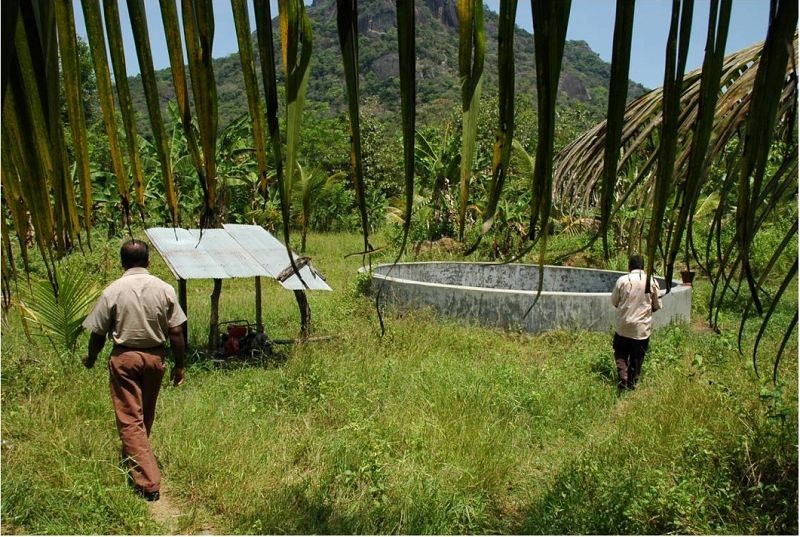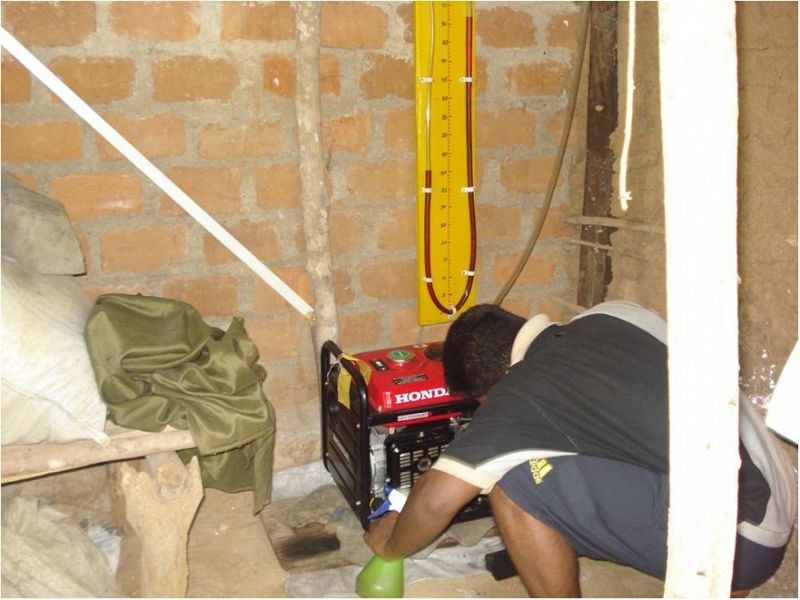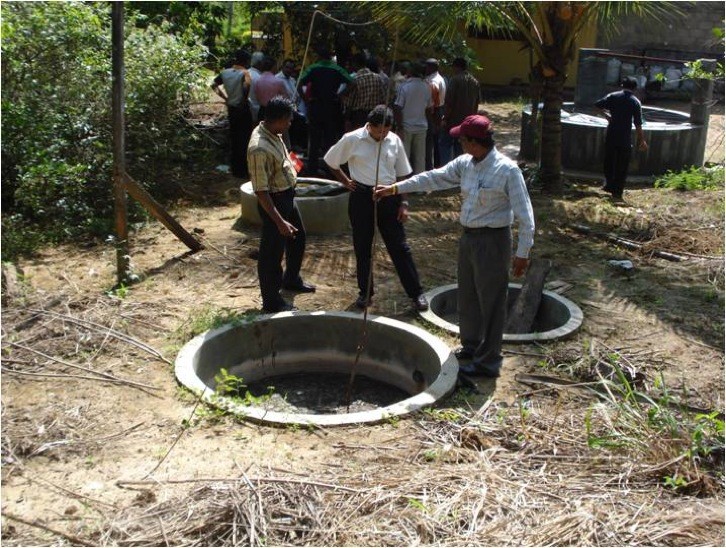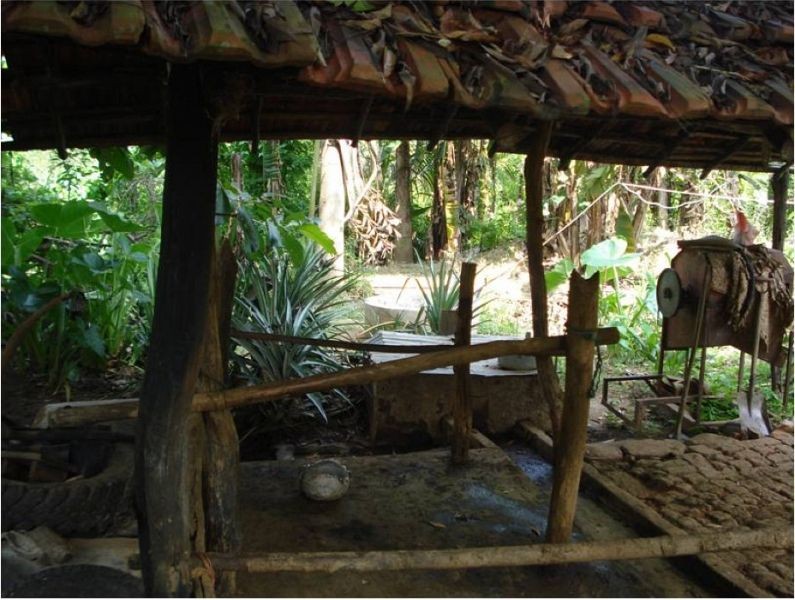To develop and establish procedures and mechanisms to make electricity generated from biogas a feasible option for rural off-grid communities in the Sri Lankan dry zone
 Today 1.2 million households and about 4.5 million people in Sri Lanka are still not connected to the electricity grid. To demonstrate that decentralised electrification of these communities is possible with electrical energy generated from biogas, Energy Forum has implemented this project. One of the main objectives has been to promote biogas as a mainstream off-grid energy technology in Sri Lanka.
Steps were taken to establish 12 pilot projects, which consisted of eleven Chinese type biogas units and one Small Batch Type biogas plant. To manage and operate the biogas power plants in the future, a community based organization (CBO) has been established in each village. Based on the experiences during the implementation of the 12 pilot projects, Energy Forum formulated a training manual for biogas power production. Following a 3-day training programme was run to selected potential biogas power developers. Parallel sessions have been conducted for developing financing schemes with officials of Provincial Councils and Regional Banks under the RERED project (Renewable Energy for Rural Economic Development Project). Energy Forum monitors the future performance of the pilot projects with the assistance of the Federation of Electricity Consumer Societies for another 3 years after project completion. Furthermore steps have been taken to draft biogas power standards for Sri Lanka.
Today 1.2 million households and about 4.5 million people in Sri Lanka are still not connected to the electricity grid. To demonstrate that decentralised electrification of these communities is possible with electrical energy generated from biogas, Energy Forum has implemented this project. One of the main objectives has been to promote biogas as a mainstream off-grid energy technology in Sri Lanka.
Steps were taken to establish 12 pilot projects, which consisted of eleven Chinese type biogas units and one Small Batch Type biogas plant. To manage and operate the biogas power plants in the future, a community based organization (CBO) has been established in each village. Based on the experiences during the implementation of the 12 pilot projects, Energy Forum formulated a training manual for biogas power production. Following a 3-day training programme was run to selected potential biogas power developers. Parallel sessions have been conducted for developing financing schemes with officials of Provincial Councils and Regional Banks under the RERED project (Renewable Energy for Rural Economic Development Project). Energy Forum monitors the future performance of the pilot projects with the assistance of the Federation of Electricity Consumer Societies for another 3 years after project completion. Furthermore steps have been taken to draft biogas power standards for Sri Lanka.
Technology, Operations & Maintenance
 Biogas is a fuel generated from organic waste materials, under anaerobic conditions. The two types of biogas technologies that have been installed need daily feeding of material into the digester. The main feedstock for the Chinese type biogas plants are pig and cow dung and for the small batch system only straw is used. Both resources is widely available in the dry zone areas of Sri Lanka. For the establishment of the batch type digester a separate gasholder to store the generated biogas is needed. Besides the biogas plant, a powerhouses for electricity generation has been built in each community. The generated electricity is distributed among the members of the CBO using a stand- alone mini-grid. To operate and maintain the power plants, operators have been trained and for further replication another training program has been established to train project developers and biogas unit constructors.
Biogas is a fuel generated from organic waste materials, under anaerobic conditions. The two types of biogas technologies that have been installed need daily feeding of material into the digester. The main feedstock for the Chinese type biogas plants are pig and cow dung and for the small batch system only straw is used. Both resources is widely available in the dry zone areas of Sri Lanka. For the establishment of the batch type digester a separate gasholder to store the generated biogas is needed. Besides the biogas plant, a powerhouses for electricity generation has been built in each community. The generated electricity is distributed among the members of the CBO using a stand- alone mini-grid. To operate and maintain the power plants, operators have been trained and for further replication another training program has been established to train project developers and biogas unit constructors.
Financial Issues & Management
 Each community has collectively contributed € 2,000 to the capital cost of the project. In addition the communities provided unskilled labour for the construction work. It has been compulsory for the end users to provide unskilled labour worth of € 50 and to pay a registration fee of € 50 per family to be a member of the Electricity Consumer Society which will own the power plant. The monthly operation and maintenance costs per household is estimated at € 1.75- 2.00. To manage the power plant in the future, training modules had been developed to train local community leaders on responsibilities, technical capabilities, staff and funds management, records keeping, accounts maintaining and qualities of leadership.
Each community has collectively contributed € 2,000 to the capital cost of the project. In addition the communities provided unskilled labour for the construction work. It has been compulsory for the end users to provide unskilled labour worth of € 50 and to pay a registration fee of € 50 per family to be a member of the Electricity Consumer Society which will own the power plant. The monthly operation and maintenance costs per household is estimated at € 1.75- 2.00. To manage the power plant in the future, training modules had been developed to train local community leaders on responsibilities, technical capabilities, staff and funds management, records keeping, accounts maintaining and qualities of leadership.
Environmental Issues
The main environmental benefit of the biogas power plants is their low carbon emissions. It is tentatively estimated that the biogas power potential in Sri Lanka is around 300 MW. Assuming that 300 MW of fossil-based power plants are replaced with biogas-based energy, the net savings of CO2 emissions would be about 1.7 million tons per year. In this particular project the reduction was around 12,800 kg CO2 for the first year. Additional environmental benefits come from the by products of the biogas production as these can be used as fertilizer to aid crop growing, which reduces the chemical use of fertilizers. Furthermore, the biogas slurry is a pest repellent and hence can replace pesticides in agricultural use.Social Issues
The original concept was to test the establishment of community biogas power systems with community owned common animal sheds. However, this idea was not acceptable to the community as they were not willing to share a common shed for their animals as that was against their culture. To overcome this issue the Energy Forum tested possible options with individually owned animal sheds, which has also proofed to be successful.Results & Impacts
During the project 12 schemes have been established and are providing electricity to 56 households and water supply to 80 households. The energy systems satisfy all energy requirements of the households: energy for cooking, electricity and water supply. The access to modern energy services and clean water has significantly improved the living conditions in rural communities.Replicability
 The biogas scheme that has been tested in the project is replicable, both within Sri Lanka and within other countries, particularly those in Africa. Within Sri Lanka the scheme can be used in rural dry areas with biomass supply produced from livestock and agricultural plantations. Once successfully implemented in the dry zone, the schemes can be adapted to address waste management issues within peri- urban areas. Well-established financing schemes exist within Sri Lanka for other off-grid energy technologies such as Solar Photovoltaic, Micro-Hydro, Wind, and Dendro power. Following completion of this project, biogas will qualify for these finances and will be eligible for Technical Assistance Grants.
The biogas scheme that has been tested in the project is replicable, both within Sri Lanka and within other countries, particularly those in Africa. Within Sri Lanka the scheme can be used in rural dry areas with biomass supply produced from livestock and agricultural plantations. Once successfully implemented in the dry zone, the schemes can be adapted to address waste management issues within peri- urban areas. Well-established financing schemes exist within Sri Lanka for other off-grid energy technologies such as Solar Photovoltaic, Micro-Hydro, Wind, and Dendro power. Following completion of this project, biogas will qualify for these finances and will be eligible for Technical Assistance Grants.
Lessons learned
The duration of the project was one year but future projects should plan more time to do some observations and tests prior the project so the long-term sustainability of the schemes can be better assured.Projects with same technology
Exchange: A Participatory Gaming Approach To Community Energy Planning in Southeast Asia: Spreading Best-Practices on Community Engagement
To increase community understanding of mini-grid design, management and operation
Exchange: Consolidating the Adoption of Small and Medium-Scale Biogas Technology by Livestock Farmers in Costa Rica
This exchange activity aims to implement a collaborative process seeking to (i) consolidate the use of biodigester technology in Costa Rica and (ii) accelerate the adoption of biogas solutions by small and medium-scale livestock farmers in the country.
Projects in same country
Pico Hydro development and scaling up, to light up the lives of rural poor in remote and inaccessible areas
To provide reliable and renewable electricity to 75 remote off-grid households, using 35 pico hydo units
Exchange: Technology Transfer on Pico-Hydro in South and Southeast Asia
To transfer Sri Lankan pico-hydro turbine manufacturing skills to micro-hydro practitioner organisations in Bangladesh, the Philippines, Myanmar and Malaysia